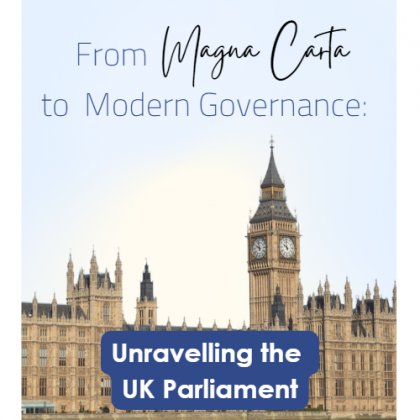Written by Isabella Pelaez, Marketing Intern
The history of the United Kingdom is intricately woven with the evolution of its Parliament. Established in the 13th century, Parliament has undergone momentous transformations that have shaped not just the UK, but have also had a significant impact on democratic governance worldwide.
Old Beginnings
The emergence of the political body which would eventually transform into Parliament can be dated back to 1215 from the signing of King John’s Magna Carta which initiated the sharing of power from the Monarch to wealthy Lords. Fast forward to 1341 under King Edward III’s reign which was marked by the arrival of two separate houses: the House of Commons which voiced the interest of the people and the House of Lords which represented nobility.
Derived from the French word “parler,” meaning “to speak,” Parliament stands as a testament to democratic deliberation and dialogue. Today, it consists of three components: the House of Commons, the House of Lords, and the Monarch, as the ceremonial head of state. The House of Commons is the lower chamber, where Members of Parliament (MPs) are elected by the people. The House of Lords is the upper chamber, consisting of appointed members, including life peers, bishops, and hereditary peers. Together, these bodies scrutinise legislation, hold the government to account, and engage in debates that shape national policy.
Everyday Life
Present day, Parliament has a pivotal role in the running of our daily life in the UK. Our COO, Jonathan, a former Government Special Advisor believes that “Parliament is the place where you can make that difference and not just by becoming an MP yourself, I mean through lobbying MPs, through campaigning. Parliament is the place in a country governed by the law where you can highlight those big issues.”
Jonathan continues, “In terms of both Houses, it’s more or less the same with one important difference. Legislation, which is making and changing the law, scrutinising the work of the government through daily question periods and debates. The one slight difference is money because the House of Commons has far more budgetary power than the House of Lords for historical reasons.”
The Role of Parliamentary Sovereignty
It is important to first consider the role of Parliamentary Sovereignty also known as legislative supremacy, which is exercised by the political institution. This sovereignty permits Parliament to create and end any law by granting them supreme legal authority in the UK. In efforts to check its own power, Parliament has passed laws that limits the unconstrained exercise of their own authority. This ensures that power is not concentrated and is subject to judicial and public scrutiny.
In the process of creating laws, both the House of Commons and the House of Lords can propose a bill. A Bill becomes an Act after the approval of both the House of Commons and the House of Lords and has been given Royal Assent by the Monarch. His Majesty has, in theory, the ability to delay a Bill proposed by Parliament thus invoking his veto but the Monarch’s role here is largely ceremonial, as Royal Assent has not been refused since the early 18th century. Once granted, the Bill becomes an Act of Parliament and part of UK law.
Public Representation
Parliament not only legislates but also serves as a platform for public representation. MPs hold regular constituency surgeries to engage with their constituents, providing the public with direct access to their representatives. Moreover, citizens can also influence Parliament through petitions, lobbying, and participation in select committees. This bridges the gap between the government and the governed, ensuring that legislation and policy reflect the will of the people.
Former SpAd Jonathan emphasizes the importance of knowing the people’s opinions by saying “Most MPs whether they are a junior backbench MP or a very senior government minister, will hold constituency surgeries where their constituents can make an appointment to see them. It’s never a bad idea to know what the people you represent think.”
The Changing Face of Parliament
Over the years, Parliament still plays a pivotal role in society as it did in the 13th century. Jonathan expressed his appreciation for the UK Parliament saying, “Fundamentally I’m a big believer in our political process because it is a big way to effect change. Everything is political, from the taxes you pay when you go shopping to the cost of food and energy, to how you’re treated at work. The vast majority of people who work in politics regardless of party are there because they believe in public service and they believe that this country is a great place and want to make it better.”
The institution's adaptability has enabled it to stand as a bastion of democracy, adapting to the ever-changing needs of society. Through its legislative, representational, and scrutinising roles, Parliament continues to shape the destiny of the United Kingdom.

